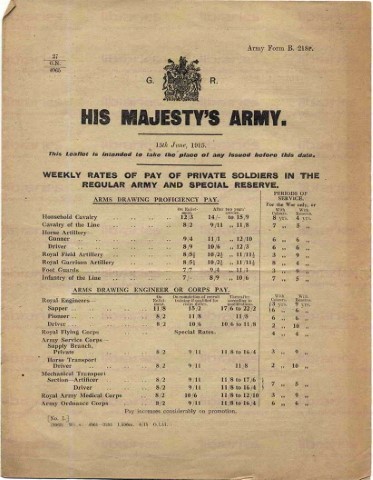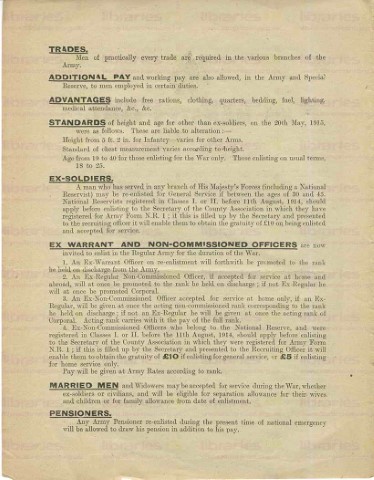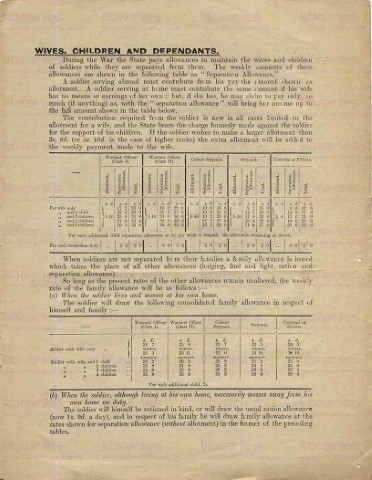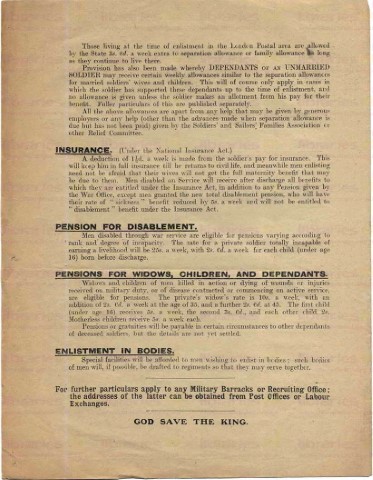Letter Details
Letter
His Majesty's Army
15th June 1915
The leaflet is intended to take the place of any issued before this date.
WEEKLY RATES OF PAY OR PRIVATE SOLDIERS IN THE REGULAR ARMY AND SPECIAL RESERVE.
ARMS DRAWING PROFICIENCY PAY.
PERIOD OF SERVICE
For War only, or
On. After Two years' With With
Enlistment Service. Colours. Reserve.
Household Cavalry 12/3 14/- to 15/9 8 yrs. 4 yrs.
Cavalry of the Line 8/2 9/11 ,, 11/8 7 ,, 5 ,,
Horse Artillery-
Gunner 9/4 11/1 ,, 12/10 6 ,, 6 ,,
Driver 8/9 10/6 ,, 12/3 6 ,, 6 ,,
Royal Field Artillery 8/5 1/2 10/2 1/2 ,, 11/11 1/2 3 ,, 9 ,,
Royal Garrison Artillery 8/5 1/2 10/2 1/2 ,, 11/11 1/2 8 ,, 4 ,,
Foot Guards 7/7 9/4 ,, 11/1 3 ,, 5 ,,
Infantry of the Line 7/- 8/9 ,, 10/6 7 ,, 5 ,,
ARMS DRAWING ENGINEER OR CORPS PAY.
On On completion of Thereafter With With
Enlistment . recruit training if according to Colours. Reserve.
qualified for qualifications.
corps duties.
Royal Engineers- 3 yrs. 9 yrs.
Sapper 11/8 15/2 17/6 to 22/2 6 ,, 6 ,,
Pioneer 8/2 11/8 11/8 6 ,, 6 ,,
Driver 8/2 10/6 10/6 to 11/8 2 ,, 10 ,,
Royal Flying Corps Special Rates 4 ,, 4 ,,
Army Service Corps-
Supply Branch
Private 8/2 9/11 11/8 to 16/4 3 ,, 9 ,,
Horse Transport
Driver 8/2 9/11 11/8 2 ,, 10 ,,
Mechanical Transport
Section-Artificer 8/2 9/11 11/8 to 17/6 7 ,, 5 ,,
Driver 8/2 9/11 11/8 to 16/4
Royal Army Medical Corps 8/2 10/6 11/8 to 12/10 3 ,, 9 ,,
Army Ordnance Corps 8/2 9/11 11/8 to 16/4 6 ,, 6 ,,
Pay increases considerably on promotion. TRADES
Men of practically every trade are required in the various branches of the Army.
ADDITIONAL PAY and working pay are also allowed, in the Army and Special Reserve, to men employed in certain duties.
ADVANTAGES include free rations, clothing, quarters, bedding, fuel, lighting, medical attendance, &c., &c.
STANDARDS of height and age for other than ex-soldiers, on the 20th May, 1915, were as follows. These are liable to alteration:-
Height from 5ft. 2in. for Infantry-varies for other Arms.
Standard of chest measurement varies according to height.
Age from 19 to 40 for those enlisting for the War only. Those enlisting on usual terms, 18 to 25.
EX-SOLDIERS
A man who has served in any branch of His Majesty's Forces (including a National Reservist) may be re-enlisted for General Service of between the ages of 30 and 45. National Reservists registered in Classes I. or II. Before 11th August 1914, should apply before enlisting to the Secretary of the County Association in which they have registered for Army Form N.R. 1; if this is filled up by the Secretary and presented to the recruiting officer it will enable them to obtain the gratuity of £10 on being enlisted and accepted for service.
EX WARRANT AND NON-COMMISSIONED OFFICERS are now invited to enlist in the Regular Army for the duration of the War.
1. An Ex-Warrant Officer on re-enlistment will forthwith be promoted to the rank he held on discharge from the Army.
2. An Ex-Regular Non-Commissioned Officer, if accepted for service at home and abroad, will at once be promoted to the rank he held on discharge; if not Ex-Regular he will at once be promoted Corporal.
3. An Ex-Non-Commissioned Officer accepted for service at home only, if an Ex-Regular, will be given at once the acting non-commissioned rank corresponding to the rank he held on discharge; if not an Ex-Regular he will be given at once the acting rank of Corporal. Acting rank carries with it pay of the full rank.
4. Ex-Non-Commissioned Officers who belong to the National Reserve, and were registered in Classes I. or II. Before the 11th August, 1914, should apply before enlisting to the Secretary of the County Association in which they were registered for Army Form N.R. 1; if this is filled up by the Secretary and presented to the Recruiting Officer it will enable them to obtain the gratuity of £10 if enlisting for general service, or £5 if enlisting for home service only.
Pay will be given at Army Rates according to rank.
MARRIED MEN and Widowers may be accepted for service during the War, whether ex-soldiers or civilians, and will be eligible for separation allowance for their wives and children or for family allowance from date of enlistment.
PENSIONERS.
Any Army Pensioner re-enlisted during the present time of national emergency will be allowed to draw his pension in addition to his pay. WIVES, CHILDREN AND DEPENDANTS.
During the War the State pays allowances to maintain the wives and children of soldiers while they are separated from them. The weekly amounts of these allowances are shewn in the following table as "Separation Allowance."
A soldier serving abroad must contribute from his pay the amount shown as allotment. A soldier serving at home must contribute the same amount if his wife has no means or earning of her own; but, if she has, he may claim to pay only so much (if anything) as, with the "separation allowance" will bring her income up to the full amount shown in the table below.
The contribution required from the soldier is now in all cases limited to the allotment for a wife, and the State bears the charge formerly made against the solider for the support of his children. If the soldier wishes to make a larger allotment than 3s. 6d. (or 5s. 10d. in the case of higher ranks) the extra allotment will be added to the weekly payment made to the wife.
When soldiers are not separated from their families a family allowance is issued which takes the place of all other allowances (lodging, fuel and light, ration and separation allowance). So long as the present rates of the other allowances remain unaltered, the weekly rate of the family allowance will be as follows:- (a) When the soldier lives and messes at his own home.The soldier will draw the following consolidated family allowance in respect of himself and family:- (b) When the soldier, although living at his own home, necessarily messes away from his own home on duty. The solider will himself be rationed in kind, or will draw family allowance (now 1s. 9d. a day), and in respect of his family he will draw family allowance at the rates shown for separation allowance (without allotment) in the former of the preceding tables. Those living at the time of enlistment in the London Postal area are allowed by the State 3s. 6d. a week extra to separation allowance or family allowance as long as they continue to live there.Provision has also been made whereby DEPENDANTS OF AN UNMARRIED SOLDIER may receive certain weekly allowances similar to separation allowances for married soldiers' wives and children. This will of course only apply in cases in which the soldier has supported these dependants up to the time of enlistment, and no allowance is given unless the soldier makes an allotment from his pay for their benefit. Fuller particulars of this are published separately. All the above allowances are apart from any help that may be given be generous employers or any help (other than the advances made when separation allowance is due but not been paid) given by the Soldiers' and Sailors' Families Association or other Relief Committee.INSURANCE. (Under the National Insurance Act.)A deduction of 1 1/2 d. a week is made from the soldier's pay for insurance. This will keep him in full insurance till he returns to civil life, and meanwhile men enlisting need not be afraid that their wives will not get the full maternity benefit that may be due to them. Men disabled on Service will receive after discharge all benefits to which they are entitled under the Insurance Act, in addition to any Pension given by the War Office, except men granted the new total disablement pension, who will have their rate of "sickness" benefit reduced by 5s. a week and will not be entitled to "disablement" benefit under the Insurance Act.PENSION FOR DISABLEMENT.Men disabled through war service are eligible for pensions varying according to rank and degree of incapacity. The rate for a private soldier totally incapable of earning a livelihood will be 25s. a week, with 2s. 6d. a week for each child (under age 16) born before discharge.PENSIONS FOR WIDOWS, CHILDREN, AND DEPENDANTS.Widows and children of men killed in action or dying of wounds or injuries received on military duty, or of disease contracted or commencing on active service, are eligible for pensions. The private's widow's rate in 10d. a week, with an addition of 2s. 6d. a week at the age of 35, and further 2s. 6d at 45. The first child (under age 16) receives 5s. a week, the second 3s. 6d., and each other child 2s. Motherless children receive 5s. a week each. Pensions or gratuities will be payable in certain circumstances to other dependants of deceased soldiers, but the details are not yet settled. ENLISTMENT IN BODIESSpecial facilities will be afforded to men wishing to enlist in bodies; and such bodies of men will, if possible, be drafted to regiments so that they may serve together. For further particulars apply to any Military Barracks or Recruiting Office; the addresses of the latter can be obtained from Post Offices or Labour Exchanges. GOD SAVE THE KING.
Footnotes
There are no footnotes associated with this letter.



